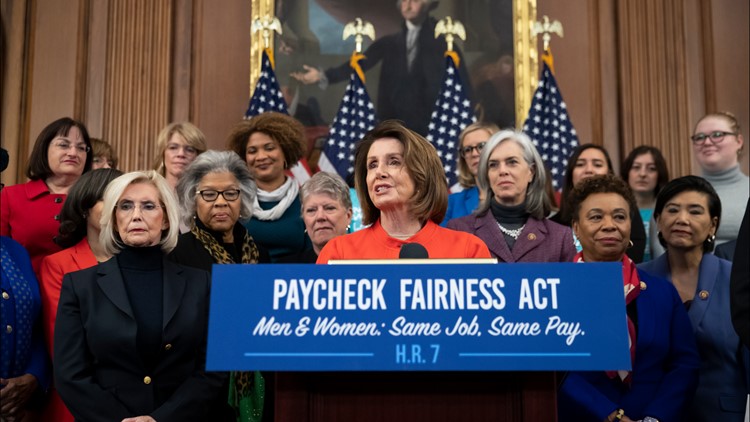WASHINGTON, D.C., USA — Maine Democratic Reps. Jared Golden and Chellie Pingree voted in support of the Paycheck Fairness Act, which passed through the House on Thursday.
House Democrats approved legislation that they say would help close the gap between what men and women are paid in the workplace, though the measure faces little chance of overcoming Republican opposition in the Senate.
“Equal pay for equal work is one of the most strongly supported policies in Maine’s Second Congressional District and I hear about it frequently from constituents from all over,” Golden said in a statement. “It’s a simple matter of fairness — if you are putting in the same hard work and getting the job done, you deserve equal pay no matter if you are a man or a woman.”
The bill would make it easier to sue employers over pay discrimination, curb the ability of companies to retaliate, and beef up enforcement of existing laws, including a new requirement that businesses submit detailed pay data to the federal government for use in policing pay discrimination laws. It would also ban employers from prohibiting employees from discussing their salaries.
“58 years after the enactment of the Equal Pay Act, full-time working women still earn just 82 cents, on average, for every dollar a man earns, amounting to a yearly gap of $10,157. The wage gap is even larger for women of color," Pingree said in a statement. "That’s why, today I proudly voted for the Paycheck Fairness Act to modernize and strengthen the Equal Pay Act of 1963 and bring our country one step closer to ensuring that women receive equal pay for equal work.”
Pingree shared her support for the act on Twitter by posting the difference between men's and women's salaries.
Republicans say laws already on the books outlaw pay discrimination. And they counter that the bill would largely be a boon for trial lawyers looking to sue companies while miring employers in burdensome new reporting requirements that would require them to submit detailed pay information to the federal government.
Rep. Michael Burgess, R-Texas, said that “wage discrimination has no place in any society.” But he said the Democrats' bill wasn't the right way to go about correcting those wrongs.
Democrats counter, however, that existing protections have proved insufficient, including those offered under the Equal Pay Act of 1963, which requires that men and women in the same workplace be given equal pay for equal work.
The bill faces little chance of overcoming Republican opposition in the Senate. Maine Independent Sen. Angus King in February joined the push to strengthen established equal pay laws and helped his colleagues reintroduce the Paycheck Fairness Act.
King said the proposal is “about fairness” and establishing that “gender should not be a factor in setting a pay grade for the same job.”
In 2010, Maine Republican Sen. Susan Collins voted against the bill when it went to a vote in the Senate. In a statement after her "No" vote, Collins said although she supports equal pay for equal work, "I am concerned that this particular legislation would unnecessarily impose increased costs and restrictions on small businesses in an already difficult economic climate."
"By eliminating caps on punitive and compensatory damages, this bill would expose the small business community to excessive litigation, force employers to devote significantly more resources toward legal protections, and could stunt job creation, ultimately hurting those its supporters say they’re trying to protect," she said. "In addition, this bill would require businesses to disclose previously confidential salary information to the government, and it relies upon faulty methods for identifying wage discrimination. That is why many business groups oppose this legislation, including the National Federation of Independent Businesses, our nation’s largest small business advocacy group, and the U.S. Chamber of Commerce.”



